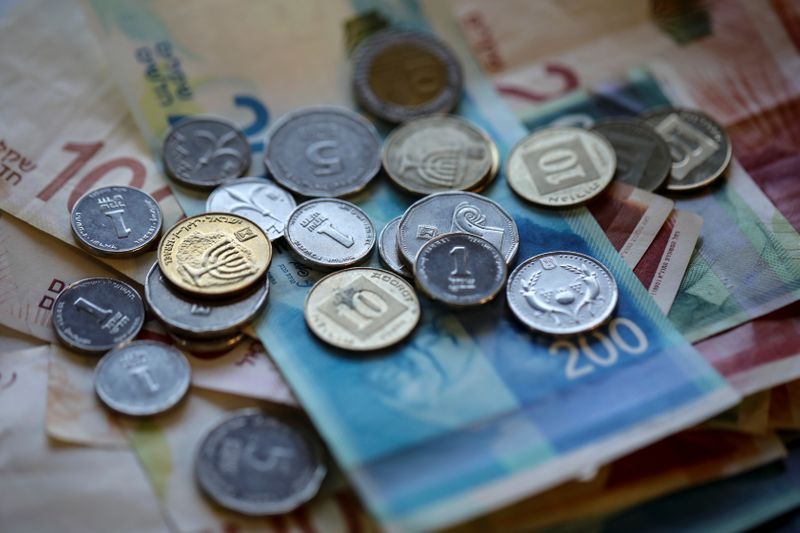By Steven Scheer
JERUSALEM (Reuters) - It has taken $50 billion and two years but the Bank of Israel may have finally accepted it is time to pare interventions and let the shekel juggernaut roll on.
What might be changing the equation - alongside the healthy 7% GDP expansion expected this year - is inflation which is gradually inching towards the top of the official target.
So without entirely abandoning interventions, the central bank is expected by economists to sharply cut back on forex purchases, a strategy adopted years ago to curb the relentless shekel appreciation.
The shekel on Monday hit 3.08 per dollar, the highest since 1996.
It is the top performing emerging currency since the pandemic started roiling financial markets in early 2020, up 10%, while gaining 12% against its main trading partners. The shekel has gained nearly 4% in the year-to-date, making it one of the top three 2021 emerging currencies.
All this despite Israel - unlike many other developing countries - having yet to raise its 0.1% interest rate.
(For graphic on Emerging currencies since the start of the pandemic: https://fingfx.thomsonreuters.com/gfx/mkt/dwpkrealzvm/Emerging%20currencies%20since%20the%20start%20of%20the%20pandemic.PNG)
The shekel's strength has been attributed to a number of factors as well as the overall weakness of the dollar: a rapid economic recovery from the COVID-19 crisis amid a widespread vaccination programme; a large current account surplus that is expected to reach 5.5% of GDP in 2021, thanks in part to Israel's tech firms; and huge foreign direct investment in the sector that may hit $30 billion this year.
Gains in overseas stock markets also often lift the shekel because Israeli pension funds and other institutions are required to cap their foreign currency exposure. That has forced them to sell $20 billion into the market this year.
INFLATION EQUATION
"You have all these factors and to expect the Bank of Israel to try and prevent a sharp shekel appreciation is not realistic," Jonathan Katz, chief economist at Tel Aviv brokerage Leader Capital Markets said, adding it was possible to infer from comments by BoI governor Amir Yaron that he prefers to not intervene.
Yaron took office in late-2018 and stayed on the sidelines in 2019, ignoring an 8% shekel surge and an outcry from exporters. But he intervened last year as the pandemic necessitated support.
Now the picture is different, with the central bank expecting growth of 7% this year.
"His world view is when the economy is recovering and we're in good shape ... there's less need to intervene. But there will be pain for exporters," said Katz, predicting dollar-shekel likely at 3 by year-end.
Katz likens Israel's booming high-tech sector to the country's natural gas sector in 2013, when the BoI also bought dollars of try to offset the sector's impact on the surging shekel. Without sufficient offset for that one sector, other exporters suffer, he said.
(For graphic on Israel current account and foreign direct investment: https://fingfx.thomsonreuters.com/gfx/mkt/zdpxonrjjvx/Israel%20current%20account%20and%20foreign%20direct%20investment.PNG)
Earlier this year, Yaron seemed to be following the route set by his predecessors whose intervention campaigns have pushed BoI reserves to a record 47% of GDP. After buying $21 billion last year, the BoI announced up to $30 billion of forex purchases for 2021.
But last week, Yaron called the $30 billion programme, which ended on Oct. 27 when it hit that level, an "exceptional plan for exceptional times". BoI said it would not extend the programme, instead reverting back to unannounced interventions when deemed economically necessary.
EXPORTER CONCERN
Modi Shafrir, chief strategist at Mizrahi Tefahot Bank's finance division, expects interventions to decline in 2022, given Israel's 2.5% inflation print in September -- towards the upper end of its annual 1%-3% target.
"At the beginning of 2021, we had deflation and ... now, we are in a different, very different area," Shafrir said. "The shekel appreciation slightly reduces the inflation coming from the supply side."
(For graphic on Israel interest rate inflation and the shekel: https://fingfx.thomsonreuters.com/gfx/mkt/gdpzydwjevw/Israel%20interest%20rate%20inflation%20and%20the%20shekel.PNG)
The central bank has created a process that allowed the economy to gradually adapt and move to a services focus, away from production, Yaron told reporters last week, adding:
"The monetary policy committee looks at exporters but also at importers and consumers. The macroeconomic picture of the economy emerging from the crisis a good one."
Unannounced interventions -- and there have been a few recently according to traders -- prevent episodes of excessive strength while allowing gradual gains, Goldman Sachs (NYSE:GS) wrote, predicting "continued, gradual shekel appreciation". They forecast a 3.05 rate in six months.
Israel's high-value tech exports, comprising 14% of GDP, are relatively insulated from exchange rate swings, but Yaron's comments and actions have not sat well with other exporters.
Israel Chemicals for instance said the currency strength hurt operating profit by $17 million in the third quarter over a year earlier.
Ron Tomer, head of Israel's Manufacturers' Association, said a third of manufacturers had shifted some production overseas "and it keeps on growing".

"Until the latest shekel move, a lot of companies were selling at cost or even at small losses," Tomer told Reuters. "Now with the shekel at 3.10 ... we reached a point in which people can no longer dip into pocket money."
He urged policymakers to continue interventions and the government to step in, because "when you have the shekel strengthening 3% in a week, you can't sustain any plan".
